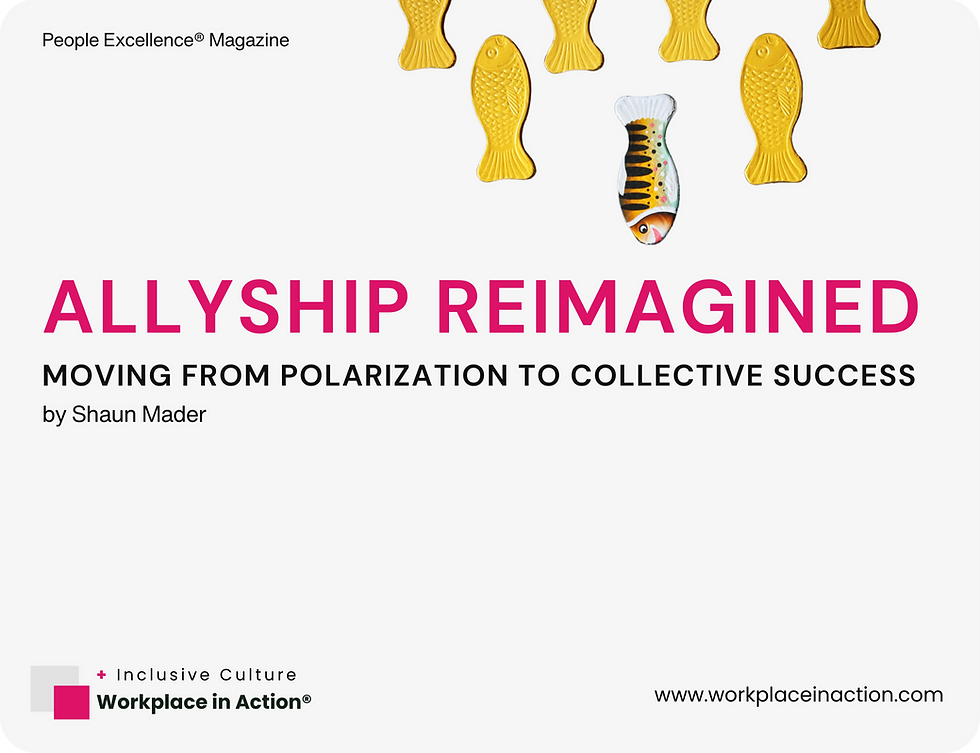Women Empowerment & Male Allyship
- Jun 22, 2024
- 3 min read
Updated: Nov 9, 2024
by Nadire Ercan Workplace in Action® - Global DEI Director

In the dynamic landscape of modern business, the empowerment of women and the role of male allyship are pivotal elements driving progress toward a more inclusive and equitable workplace. Women's empowerment involves providing equal opportunities, fostering an environment where women can thrive, and addressing systemic barriers that hinder their advancement. Meanwhile, male allyship encompasses the actions and support men can provide to help achieve gender equality. These concepts create a powerful synergy that enhances organizational culture and performance.
Women's empowerment in business is multifaceted. It starts with ensuring equal access to opportunities. This involves creating pathways for women to enter and advance in traditionally male-dominated fields such as technology, engineering, and leadership roles. Implementing targeted recruitment and retention programs for women is essential. These initiatives are designed to attract female talent and provide the support needed to succeed, such as mentorship programs, leadership training, and flexible work arrangements.
Another critical aspect of women's empowerment is addressing the gender pay gap. Despite progress in many areas, women still earn less than their male counterparts for similar work. Organizations must conduct regular pay audits and implement transparent salary structures to ensure fairness. For instance, conducting company-wide pay audits and committing to closing any identified pay gaps sets a precedent for providing fair compensation practices.
Workplace culture also plays a crucial role in empowering women. An inclusive culture where diverse perspectives are valued and respected can significantly impact women's ability to thrive. This includes policies that support work-life balance, such as parental leave and flexible working hours, which are essential for women who often bear a disproportionate share of caregiving responsibilities. Implementing family-friendly policies, such as on-site childcare and extended parental leave, demonstrates a commitment to supporting women professionally and personally.
Male allyship complements women's empowerment. It involves men actively supporting and advocating for gender equality in the workplace. Male allies can leverage their positions of influence to promote policies and practices that benefit all employees, regardless of gender. For example, men in leadership roles can ensure women's voices are heard in meetings, advocate for advancement, and challenge discriminatory practices and behaviors.
Education and awareness are foundational to effective male allyship. Men must understand the challenges and biases that women face in the workplace. Training programs highlighting unconscious bias, microaggressions, and the importance of inclusive behavior can help achieve this. By recognizing these challenges, male allies can proactively address them, creating a more supportive environment for their female colleagues.
One practical example of male allyship is the implementation of sponsorship programs. Unlike mentorship, which focuses on providing advice and support, sponsorship involves advocating for the career advancement of protégés. Senior male leaders can sponsor talented women, giving them the visibility and opportunities to advance their careers. This benefits the women being funded and enriches the organization by ensuring a diverse leadership pipeline.
Male allies can also play a critical role in promoting work-life balance policies. By taking advantage of parental leave and flexible working arrangements, men can help normalize these practices and reduce the associated stigma. This can create a more equitable environment where both men and women feel supported balancing their professional and personal lives.
The intersection of women's empowerment and male allyship creates a robust framework for achieving gender equality in the workplace. Companies promoting these principles often see numerous benefits, including improved employee satisfaction, increased innovation, and better financial performance. Diverse teams are known to bring a broader range of perspectives and ideas, leading to more effective problem-solving and decision-making.
Moreover, fostering an inclusive environment where women feel empowered and supported by their male colleagues can enhance organizational culture. It promotes a sense of belonging and respect among all employees, leading to higher engagement and productivity.
Women's empowerment and male allyship are crucial components of a progressive and inclusive business environment. By providing equal opportunities, addressing systemic barriers, and fostering a culture of support and respect, organizations can unlock the full potential of their workforce. As men and women work together towards gender equality, the benefits extend beyond the workplace, contributing to a more equitable and just society.
_edited.png)




Comments